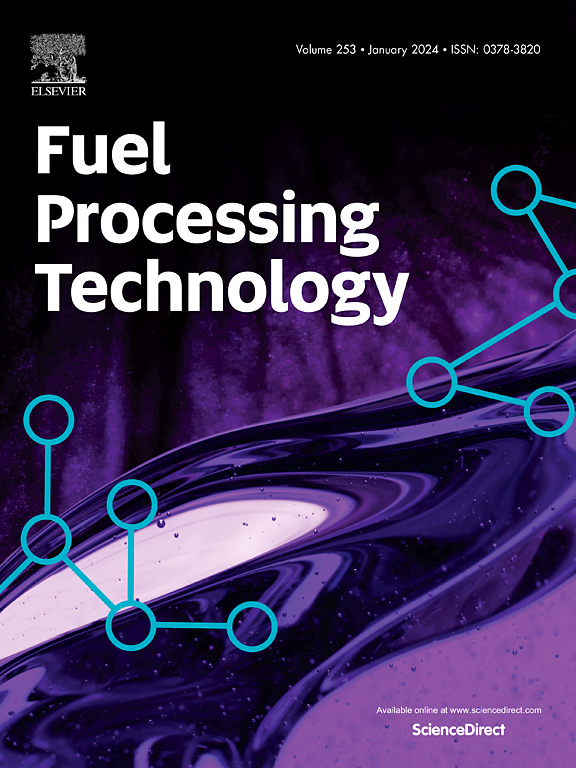Intensified methanol steam reforming over active and stable CeO2-Al2O3 supported catalysts
IF 7.2
2区 工程技术
Q1 CHEMISTRY, APPLIED
引用次数: 0
Abstract
The recent limitations imposed by the maritime rule-making units have goaded the researcher's interest towards methanol applications as near-zero emission fuel. Methanol can be either directly fed to internal combustion engineering or sent to a pre-reforming unit for hydrogen generation and further conversion in fuel cells devices. In this scenario, the optimization of the reforming unit is crucial to achieve high hydrogen yields.
This study investigates the activity, selectivity and stability of different CeO2-Al2O3 supported catalysts for methanol steam reforming. Moreover, the kinetic parameters of the best performing catalyst were determined. Several mono-, bi- and trimetallic catalysts were prepared by the wet impregnation method (Ni, Cu, Ni![]() Cu, Cu
Cu, Cu![]() Ni, Zn-Ni-Cu, Pt
Ni, Zn-Ni-Cu, Pt![]() Ni, Pd
Ni, Pd![]() Ni, Pt
Ni, Pt![]() Zn, Pd
Zn, Pd![]() Zn, Pd
Zn, Pd![]() Cu) and were preliminarily screened between 200 and 600 °C under a S/C ratio of 1.5 and WHSV = 2 h−1. Looking at methanol conversion and products selectivity, the lowest CO formation was recorded over the Cu-based catalysts: the addition of 2 wt% of palladium considerably improved both CH3OH conversion and hydrogen yield. The Pd
Cu) and were preliminarily screened between 200 and 600 °C under a S/C ratio of 1.5 and WHSV = 2 h−1. Looking at methanol conversion and products selectivity, the lowest CO formation was recorded over the Cu-based catalysts: the addition of 2 wt% of palladium considerably improved both CH3OH conversion and hydrogen yield. The Pd![]() Cu formulation, rarely investigated in the recent literature, appeared very promising and was also subjected to 40 h of time-on-stream test at 300 °C, observing only a 5 % reduction in terms of both conversion and H2 yield, which were attested to 95 and 88 %, respectively, at the end of the test. Moreover, a very low coke selectivity (1.5 wt%) was recorded, with relevant deactivation resistance. Finally, based on a simplified power-law kinetic model, the activation energies for methanol steam reforming (22 kJ·mol−1), methanol decomposition (71 kJ·mol−1) and water gas shift reaction (84 kJ·mol−1) were also developed, which further demonstrated the high activity of the developed catalyst towards MSR.
Cu formulation, rarely investigated in the recent literature, appeared very promising and was also subjected to 40 h of time-on-stream test at 300 °C, observing only a 5 % reduction in terms of both conversion and H2 yield, which were attested to 95 and 88 %, respectively, at the end of the test. Moreover, a very low coke selectivity (1.5 wt%) was recorded, with relevant deactivation resistance. Finally, based on a simplified power-law kinetic model, the activation energies for methanol steam reforming (22 kJ·mol−1), methanol decomposition (71 kJ·mol−1) and water gas shift reaction (84 kJ·mol−1) were also developed, which further demonstrated the high activity of the developed catalyst towards MSR.

在活性稳定的CeO2-Al2O3负载催化剂上强化甲醇蒸汽重整
最近海事规则制定单位施加的限制促使研究人员对甲醇作为近零排放燃料的应用产生了兴趣。甲醇既可以直接用于内燃工程,也可以送到预重整装置进行制氢,并在燃料电池装置中进一步转化。在这种情况下,重整装置的优化是实现高产氢率的关键。研究了不同负载型CeO2-Al2O3催化剂在甲醇蒸汽重整中的活性、选择性和稳定性。此外,还确定了最佳催化剂的动力学参数。采用湿浸渍法制备了Ni、Cu、NiCu、CuNi、Zn-Ni-Cu、PtNi、PdNi、PtZn、PdZn、PdCu等单金属、双金属和三金属催化剂,并在温度为200 ~ 600℃、S/C比为1.5、WHSV = 2 h−1条件下进行了初步筛选。观察甲醇转化率和产物选择性,在cu基催化剂上记录了最低的CO生成:添加2 wt%的钯显著提高了CH3OH转化率和氢产量。PdCu配方,在最近的文献中很少研究,看起来非常有前途,并且在300°C下进行了40小时的流上时间测试,观察到转化率和H2产率仅降低了5%,在测试结束时分别证明了95%和88%。此外,记录了非常低的焦炭选择性(1.5 wt%),并具有相应的失活阻力。最后,基于简化幂律动力学模型,得到了甲醇蒸汽重整反应(22 kJ·mol−1)、甲醇分解反应(71 kJ·mol−1)和水煤气移位反应(84 kJ·mol−1)的活化能,进一步证明了催化剂对MSR的高活性。
本文章由计算机程序翻译,如有差异,请以英文原文为准。
求助全文
约1分钟内获得全文
求助全文
来源期刊

Fuel Processing Technology
工程技术-工程:化工
CiteScore
13.20
自引率
9.30%
发文量
398
审稿时长
26 days
期刊介绍:
Fuel Processing Technology (FPT) deals with the scientific and technological aspects of converting fossil and renewable resources to clean fuels, value-added chemicals, fuel-related advanced carbon materials and by-products. In addition to the traditional non-nuclear fossil fuels, biomass and wastes, papers on the integration of renewables such as solar and wind energy and energy storage into the fuel processing processes, as well as papers on the production and conversion of non-carbon-containing fuels such as hydrogen and ammonia, are also welcome. While chemical conversion is emphasized, papers on advanced physical conversion processes are also considered for publication in FPT. Papers on the fundamental aspects of fuel structure and properties will also be considered.
 求助内容:
求助内容: 应助结果提醒方式:
应助结果提醒方式:


